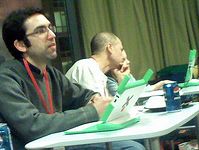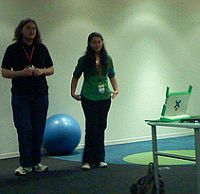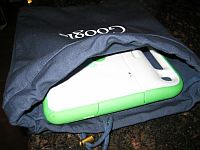On Tuesday I was in Heaven. Geek heaven, to be accurate. Google's Chicago office. The smell of…was that fresh salsa and flauta's?… wafted through the room.
Friendly green computers were tucked under numerous arms. A group of exuberant (there really is no better word) high school students from the Illinois Math and Science Academy (IMSA) twittered in a corner. Men with scruffy facial hair (I found the developers!) were scattered among the attendees.
I am Karen Smith and I was surprised to find a wide range of ages, interests, hair lengths, and body art in the room. I thought we geek-folk all looked alike. Then again, I'm a suburban mom and think all suburban moms look alike, and the suburban mom type is quite different from the geek type, so perhaps I'm not the best judge.
The Chicago OLPC community meet-up was an unqualified success. There were about 50 attendees, including a few (but not many, it was a school night) children. 5-10 of the attendees had never seen an XO laptop before. They were in luck, I spotted at least 20 of the green machines roving the room, being passed from hand to hand. Much credit and thanks goes to Mel Chua who coordinated the evening, and her hosts from Google who I never did quite catch the names of. They smiled benevolently from near the chafing dishes. They even gave us some nifty swag.
IMSA Students and OLPC
The evening opened with some presentations by the IMSA students. The thing you need to know about them is that they are scary smart. In a good way. Whatever you do, don't underestimate them. Students at IMSA are proud to hold the distinction of the only OLPC High School Interest Group.
They are working on a variety of projects from the ambitious (building an EKG device to plug into the microphone jack) to the seemingly simple (clock.) The EKG team was geeky-excited to have talked to the developer of the Measure activity about the nuances of instrumental amplifier hardware.
They haven't sustained any permanent damage from their experiments, though that left-leaning limp looked a little suspicious, and are proud to report they now know how to solder.
Their work with the acoustic tape measure activity led them to believe that the OLPC is a good tool for conducting experiments. From here, they decided to work on a module to present the scientific method. This led them to do research on the societies where OLPC laptops are targeted for, so as to understand social constraints around manner of dress and gestures for video-based content.
The seemingly simple clock activity is much more than that. The two students working on this activity came upon the idea by reading the bug reports in the OLPC system. They decided to work on an activity to not just provide a report of current time, but allow children to explore the idea of time.
A bar with a draggable sun and a simple hand-drawn graphic of a tree with a sun behind it led to much discussion among the audience about ways to cause a shadow to be cast by the tree, sundial-esque, and the possibility of using celestial charts for a OLPC Planetarium
One thing most of the students could use is programming/technical mentors for their work. The clock team mentioned the code they have available right now is too embarrassing to post anywhere, yet I predict an hour on the phone or IRC with a python guru would change that. Please consider visiting their wiki page and volunteer to help.
Chicago XO Laptop Uses
Afterwards, we heard from other OLPC enthusiasts about their pet projects and efforts. Francisco Athens from the Chicago Linux User Group is busy testing alternate operating systems on the XO. He points to the wiki for his latest information about getting XFCE working, as well as Ubuntu.
Chaz (missed his last name) from the University of Chicago talked about efforts to assist the Chicago Public Schools with integrating technology in the classroom. One hurdle will be the CPS system does not formally support Linux, but a pilot program in the 3rd/4th grade level is a possibility. They have a curricular group convening on Feb 12 for anyone interested.
Carl Karston mentioned the Chicago Python Conference in March, and made a pointed remark in the direction of the IMSA students that there were financial aid opportunities available for those who couldn't afford the conference fees. Vehan from the Python users group mentioned that the illustrious Mike Fletcher will be leading at least one workshop during the con.
Gabriel Burt talked about what he's been doing with his XO. Turns out he wants to alter the space-time continuum. More or less. As he details on his blog, he has been working out ways to get Pippy talking to the camera built into the XO laptops.
He wrote a script to create a time-lapse photo sequence, which is not the coolest part. He also discovered a way to have the computer display a videostream that is delayed, via a setdelay command of some sort. He's going to have to elaborate because all I know is that it creeped me out to hold a laptop that showed me what I did 5 seconds before.
The rest of the evening was spent in small groups sharing ideas, passing laptops around, and exchanging business cards. Note to those attending meetups – bring something with your name/email/preferred way of reaching you, even if it's one of those freebie St. Jude's Hospital name and address stickers stuck to an index card. It'll save you time so you can meet more fabulous people involved with the OLPC project.
Look for Karen Smith as "KayTi" on the OLPC News Chicago XO User Group forum.





Karen,
Thanks for this post - it's absolutely amazing what these kids are doing with their XOs. And it's only the beginning - exciting times ahead ;!
Tere's more on the same here:
Peter Christensen’s Blog - Smart Kids + OLPC = Better World
( http://www.pchristensen.com/blog/articles/smart-kids-olpc-better-world/ )
Dang, I did want to attend this. Family first. I'll try to make the next.
Chuck "Retrofit"
The annual Python Conference http://us.pycon.org/2008/about/ will be in Chicago this year, in March. I am organizing the OLPC booth. Volunteers with XOs welcome.
I'm User:Mokurai on the OLPC Wiki.
Just now I asked the PyCon organizers:
I suggest that someone contact the Chicago OLPC group and find out more about the following project. Can we invite them to the code sprints? [http://us.pycon.org/2008/sprints/] Can we get some passes to bring IMSA students into the OLPC booth, or let them attend the whole conference? [It turns out that financial aid is available.]
[link to this article]
PyCon is in need of XOs for a tutorial by Mike Fletcher.
Let me know of any other ideas you have for PyCon, or join the PyCon-organizers mailing list yourself. PyCon 2009 will also be in Chicago, so we can plan in much more detail for then.
Shaz Razul, managing director of CUIP; http://cuip.net